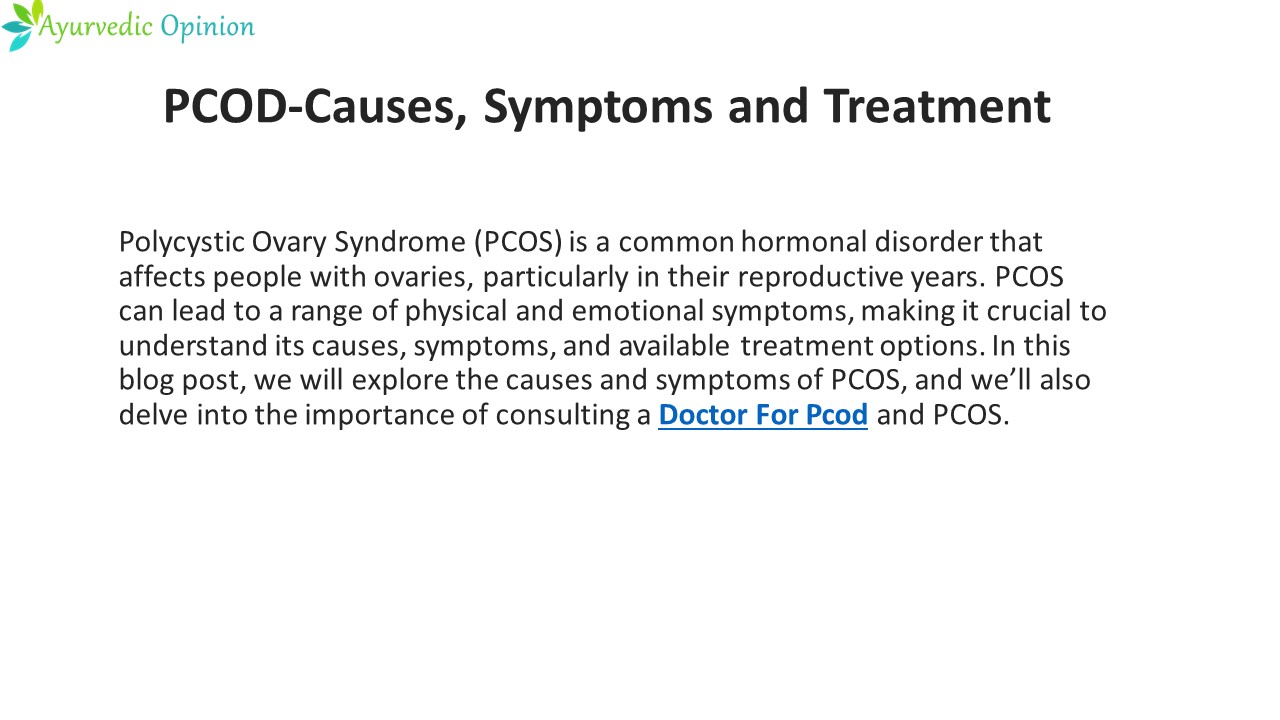PCOD-Causes, Symptoms and Treatment
Title:
PCOD-Causes, Symptoms and Treatment
Description:
In the Ayurvedic opinion, seeking a Doctor For Pcod provides holistic solutions. Ayurvedic treatments, diet adjustments, and personalized care empower you to manage PCOD naturally. Discover well-being and balance through Ayurveda's expert guidance. – PowerPoint PPT presentation
Number of Views:2
Title: PCOD-Causes, Symptoms and Treatment
1
PCOD-Causes, Symptoms and Treatment
- Polycystic Ovary Syndrome (PCOS) is a common
hormonal disorder that affects people with
ovaries, particularly in their reproductive
years. PCOS can lead to a range of physical and
emotional symptoms, making it crucial to
understand its causes, symptoms, and available
treatment options. In this blog post, we will
explore the causes and symptoms of PCOS, and
well also delve into the importance of
consulting a Doctor For Pcod and PCOS.
2
Understanding PCOD and PCOS
- Polycystic Ovary Disorder (PCOD) and Polycystic
Ovary Syndrome (PCOS) are often used
interchangeably, but there are subtle differences
between the two. PCOD refers to the presence of
multiple cysts on the ovaries, while PCOS
encompasses not only the cysts but also a
constellation of hormonal and metabolic
imbalances. Both conditions can cause similar
symptoms, and for the purpose of this blog post,
well use PCOS to refer to both.
3
Causes of PCOS
- Hormonal Imbalance PCOS is primarily driven by
hormonal imbalances, particularly high levels of
androgens (male hormones) in the body. This
hormonal disruption can impact the normal
functioning of the ovaries. - Genetics The likelihood of having PCOS can be
raised by a family history of the illness.
Genetics plays a role in the susceptibility to
PCOS. - Insulin Resistance Insulin resistance can lead
to elevated insulin levels in the body, which, in
turn, can trigger the ovaries to produce more
androgens, exacerbating the condition.
4
Common Symptoms
- Irregular Menstrual Cycles Women with PCOS often
experience irregular or absent periods due to
disrupted ovulation. - Excessive Hair Growth Increased androgen levels
can lead to hirsutism, causing excess hair growth
on the face, chest, and back. - Acne and Oily Skin Hormonal imbalances may
result in persistent acne and excessively oily
skin. - Weight Gain Many individuals with PCOS struggle
with weight management and may find it
challenging to lose excess weight. - Fertility Issues Because of its inconsistent
ovulation, PCOS is a major contributor to
infertility. - Mood Swings Mood swings, anxiety, and despair
can be attributed to changes in hormone levels.
5
In conclusion
- In conclusion, PCOS is a complex hormonal
condition that requires individualized care and
attention. If you suspect you have PCOS or have
been diagnosed with it, consulting a Doctor For
Pcos is the first step towards managing your
condition effectively. With the right treatment
and support, many individuals with PCOS can lead
healthy, fulfilling lives.































